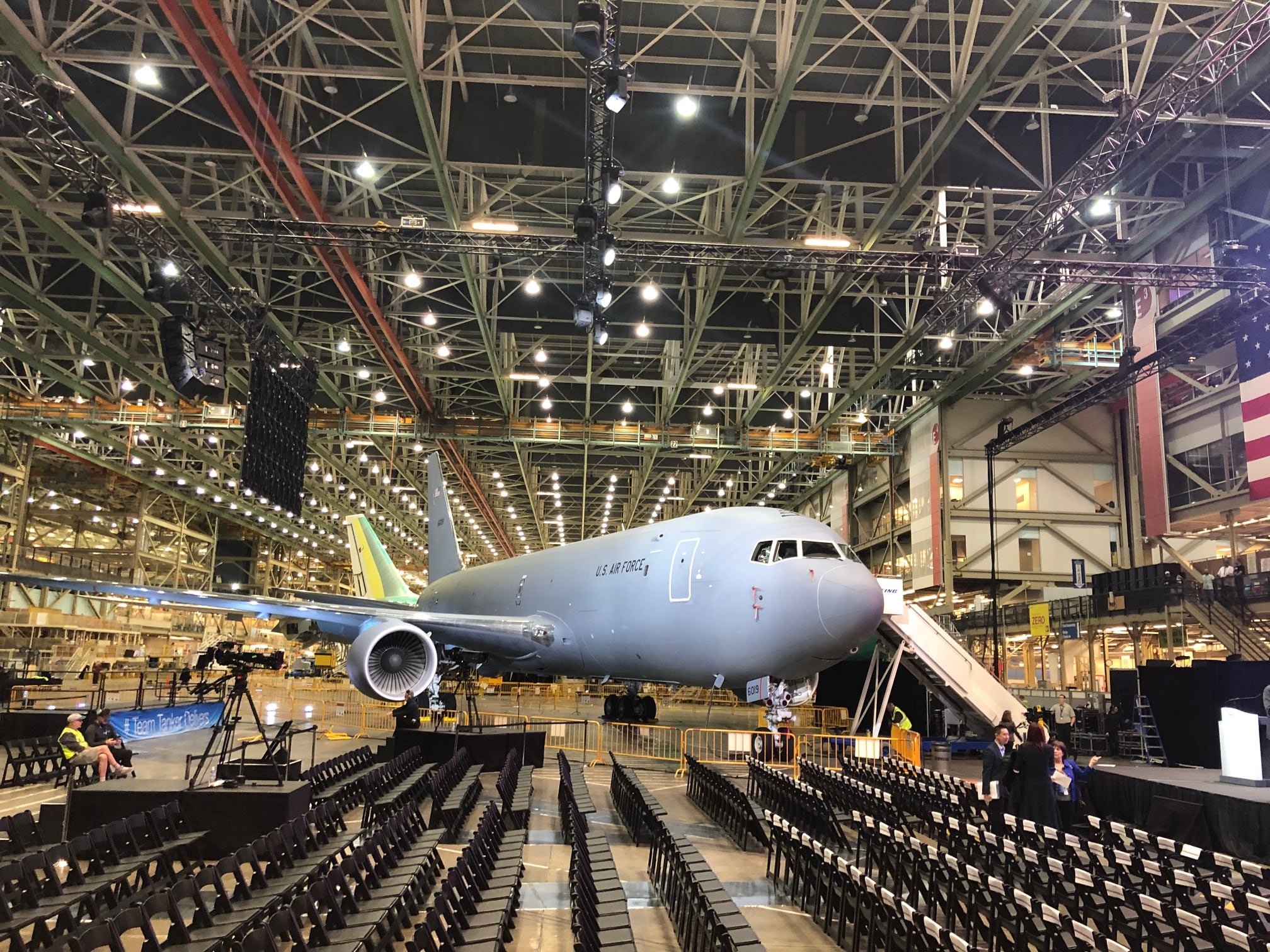The delivery of a new KC-46 Pegasus tanker aircraft to Seymour Johnson Air Force Base in North Carolina has been delayed after foreign object debris was found inside the plane by Boeing inspectors.
The delayed aircraft was to have been one of the first two KC-46s delivered to Air Force Reserve Command at Seymour Johnson on June 12. But while the first was successfully delivered, debris was found in the fuel tank of the second during its pre-acceptance inspections.
In a statement provided to Air Force Times and Defense News on Monday, the Air Force said the debris came from “non-standard factory rework,” and not the kind of “production line quality escapes” that caused the Air Force to halt KC-46 deliveries in March 2019.
Those problems with foreign object debris, or FOD, led the Air Force to put a plan in place to correct the problem.
“Boeing has made great strides on their production line focusing on product quality, tool control and FOD prevention,” the Air Force said. “However, debris left behind during non-standard production rework indicates we still have work to do to propagate the good culture changes from the production side to the broader Boeing enterprise."
“The Air Force and Boeing remain committed to process improvement, and in this specific instance, Boeing continues to investigate the root cause and corrective action,” the Air Force said.
Boeing said in its own statement that one of the company’s quality inspectors found the debris.
RELATED

“During Boeing’s thorough inspection process prior to delivery, some small manufacturing debris was discovered by a Boeing quality inspector,” Boeing spokesman Larry Chambers said. “That prompted us to perform additional inspections prior to delivering the aircraft.”
“The inspection process is working exactly as it’s supposed to,” Chambers continued. “Boeing will take all the necessary time required to deliver the highest quality aircraft to the Air Force, but we do not anticipate a significant delay. We are working with the Air Force to determine the delivery schedule.”
This delay is the latest in a series of debris-related troubles delaying Boeing’s delivery of KC-46 aircraft.
Just a month after Boeing began delivering the KC-46 to the Air Force in January 2019, the service found foreign object debris — tools or other materials used to build the aircraft — left behind in multiple KC-46s, creating a potential safety hazard. As a result, the Air Force stopped accepting new tankers over a weeks-long period in March and April 2019 as it investigated the issue.
Meanwhile, Boeing responded by putting in place changes to its manufacturing processes and a series of enhanced inspections conducted by its employees — all paid for by the company.
In June 2019, Air Force acquisition head Will Roper acknowledged that it would take time for the cultural changes at Boeing to stick. As many tankers had already moved through various stages of production without adhering to the more stringent quality control processes, it could take months for the Air Force to begin accepting tankers without FOD.
“We expect all of them are going to have foreign object debris,” he said then, according to Defense One. “As we go through and we’re doing sweeps, we’re finding FOD in the planes.”
In the case of the tanker that was held back last week, FOD was found during one of Boeing’s final inspections, before the aircraft would have transferred to the Air Force and the Defense Contracts Management Agency for government acceptance tests, said one source with knowledge of the program. That triggered another series of detailed inspections by Boeing.
So far, Boeing has delivered 34 KC-46s to McConnell AFB, Kansas; Altus AFB, Oklahoma; Pease Air National Guard Base, N.H.; and Seymour Johnson. The service plans to order 179 aircraft total.
Earlier this month, the Air Force announced that it would delay a full rate production decision for the KC-46 program until the end of fiscal 2024 so that the aircraft could be tested once major deficiencies were corrected. One issue involves replacing the tanker’s Remote Vision System, which is used by boom operators to see outside of the aircraft during the refueling process, while the other problem involves the stiffness of the KC-46 boom, which cannot refuel the A-10 Warthog.
Under its $4.9 billion fixed-price firm contract with the Air Force, Boeing is responsible for paying for all cost overruns for which it is responsible. So far, the company has paid $4.6 billion out of pocket on the program.
Stephen Losey is the air warfare reporter for Defense News. He previously covered leadership and personnel issues at Air Force Times, and the Pentagon, special operations and air warfare at Military.com. He has traveled to the Middle East to cover U.S. Air Force operations.
Valerie Insinna is Defense News' air warfare reporter. She previously worked the Navy/congressional beats for Defense Daily, which followed almost three years as a staff writer for National Defense Magazine. Prior to that, she worked as an editorial assistant for the Tokyo Shimbun’s Washington bureau.





